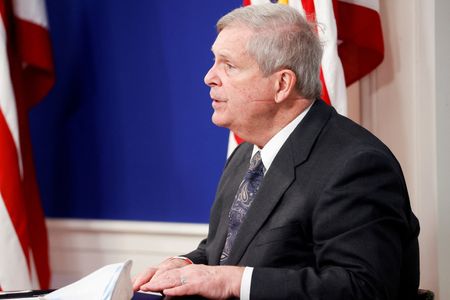By Leah Douglas
WASHINGTON (Reuters) – The United States said on Tuesday it was “disappointed” in the Mexican government’s announcement the previous day which walked back a deadline to ban genetically modified (GM) corn for animal feed and industrial use in the country, but retained its plans to ban the corn for human consumption.
“The U.S. believes in and adheres to a science-based, rules-based trading system and remains committed to preventing disruptions to bilateral agricultural trade and economic harm to U.S. and Mexican producers,” Agriculture Secretary Tom Vilsack said in a statement.
The Mexican Economy Ministry said on Monday that it was eliminating its January 2024 deadline for ending its imports of GM corn used to feed animals. The country buys about 17 million tonnes of mostly GM yellow corn from the United States each year, mostly for animal feed.
Mexico will still prohibit use of GM corn for human consumption, such as flour, dough, or tortilla made from the grain. About 20% of Mexican corn imports from the United States is white corn for food products.
It will still move forward with its plan to ban imports of the herbicide glyphosate, with a transition period in effect until March 31, 2024.
In a January meeting with Mexican officials, the U.S. Trade Representative’s (USTR) office said it was considering taking action under the U.S.-Mexico-Canada Agreement (USMCA) over the dispute, which threatens billions of dollars in corn trade.
“We are carefully reviewing the details of the new decree and intend to work with USTR to ensure our science-based, rules-based commitment remains firm,” Vilsack said on Tuesday.
USTR did not respond to a request for comment.
The United States had given the Mexican government until Tuesday to explain the science behind its proposed bans.
The National Corn Growers Association, a U.S. industry group, expressed concern over Monday’s decree.
“Singling out corn – our number one ag export to Mexico – and hastening an import ban on numerous food-grade uses makes USMCA a dead letter unless it’s enforced,” said the group’s president, Tom Haag.
(Reporting by Leah Douglas in Washington; Additional reporting by Julie Ingwersen in Chicago, Cassandra Garrison in Mexico City and David Lawder in Washington; Editing by Matthew Lewis)


